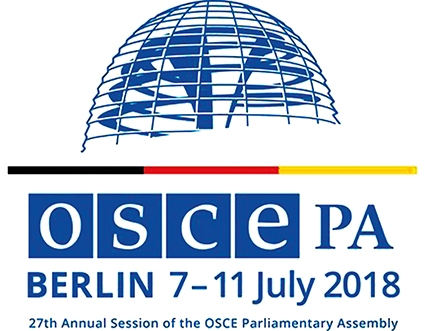OSCE Addresses Good Governance
Pollution, ocean acidification, climate change, deforestation, these are just a few of the environmental challenges that the world faces today. At the same time, poverty, corruption and inequality threaten our economic security and contribute to challenges such as migration and political instability.
There is, however, a growing consensus that good governance has a tangible effect on environmental outcomes, as well as being of importance to poverty reduction and sustainable development. This approach is what is needed if not just for Georgia, but if global civilization is to effectively address the challenges of its time.
At the Organization for Security and Co-operation in Europe, a comprehensive approach to security that links political and military affairs, democratic institutions and human rights, economics and the environment, and science and technology has always been the main focus. This multi-dimensional approach to security is rooted in the understanding that each dimension affects the other – that political stability is not possible without human rights, that security is not possible without a healthy environment and that prosperity is not possible without economic co-operation.
In the OSCE’s founding document, the Helsinki Final Act of 1975, participating States recognized that observable “changes in climate” may be the result of human activity, and issued warnings about the effects of degradation of the environment on human health.
Climate change that is “pushing civilization into uncharted territory,” such as rising sea levels, melting Arctic ice and record high temperatures, will be a focus point in the Parliamentary Assembly’s 27th Annual Session in Berlin early next month. Action and enhanced co-operation among governments, including implementation through the landmark Paris Agreement on climate change, is what is needed.
Participation at last November’s UN Climate Change Conference in Bonn by a coalition of more than 2,500 mayors, governors and others from across the United States who released the “America’s Pledge” report, outlining the scope of subnational climate action in the US, was a great encouragement following the Trump administration’s regrettable decision to withdraw from the Paris Agreement. Hopefully, the remaining signatory parties can still live up to the commitments made under the agreement.
For real progress to be made, the importance of fighting corruption and promoting good governance must be recognized. According to World Bank estimates, businesses and individuals pay an estimated $1.5 trillion in bribes each year, which is about 2% of the global GDP. In the fight against corruption, it is not enough to have a comprehensive legal framework. Worldwide effective implementation of anti-corruption provisions and monitoring is what is necessary, where there can be no exceptions.
Today, civilization is at a record high of human mobility, displacement and migration. Natural disasters, with the help of climate change, have led to a significant increase in environmental migration. Statistics suggest that the risk of human beings displaced through sudden natural disasters is 60% higher today than it was 40 years ago. It’s a very real threat that cannot be ignored.
However, the global focus on migration due to these natural factors should not divert our attention from displacement as a result of conflicts and violence of a human nature. According to the Internal Displacement Monitoring Center’s 2017 Global Report, there are twice as many internally displaced people as refugees in the world, and that they may any day become international migrants, thereby adding to the already large movements of migrants and refugees.
In Georgia, there are up to 300,000 internally displaced persons out of a population of 3.7 million – victims of ethnic cleansing and several waves of forcible displacement from Georgia’s occupied regions of Abkhazia and South Ossetia.
A tragic component of warfare has been not only its impact on civilians, but also its destruction of the environment. This affects the resilience of countries and societies, including disruption to water supplies and disposal systems, which ultimately results in the discharge of pollutants into freshwater sources. After years of war, tainted natural environments and resources could become permanent.
The ultimate goal of promoting international co-operation on economic and environmental issues is strengthening security and stability. When the Parliamentary Assembly meets in Berlin on July 7-11, readiness to work with governments in deepening partnerships to enhance co-operation on these vital issues will be the deciding factor on whether or not civilisation will continue a destructive way of life, or evolve into something better.
The future of security in economics, environmental preservation, human dignity and ultimately civilisation, depends on the cooperation, partnerships and actions of global governance, setting an example for the average individual to follow.
By Shawn Wayne











